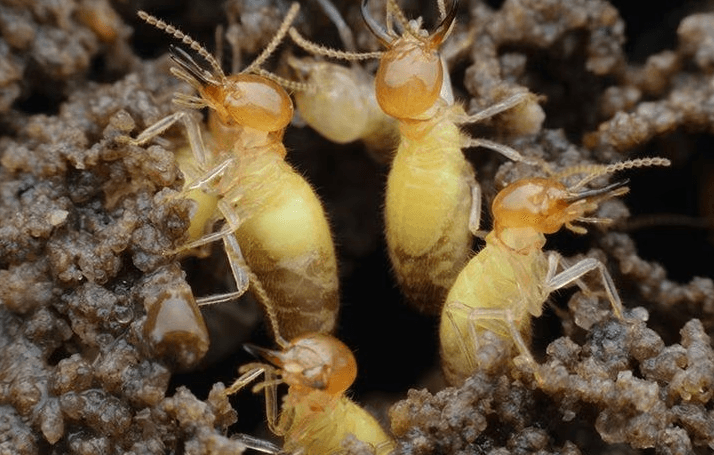
Formosan Termite Identification & Prevention In Nassau & Suffolk County, NY
What do Formosan termites look like?
Latin name: Coptotermes formosanus
Formosan termites are social insects with three distinct forms (castes):
- the wingless or winged reproductives (alates)
- the protector soldiers
- the workers
Since Formosan termite workers look very much like workers of other termite groups, the soldiers and winged alates are the castes that are useful to provide a correct identification.
Since differentiation between Formosan termites and other termite groups is not easy, it is best to contact your local home pest management professional for help with providing an accurate identification.
The head of a Formosan termite soldier is oblong, whereas indigenous subterranean termites have rectangular heads. Formosan termite soldiers are also more aggressive when defending the nest than native subterranean termite soldiers.
When disturbed, the soldiers release a white liquid that is used for defense.
The alates, or swarmers, are yellowish-brown and about ½ inch long. Alates have a thick covering of small hairs on their otherwise transparent wings.

How did I get Formosan termites?
Formosan termites come into homes via wood that touches the soil and by travelling from the ground to wood using their mud tubes. Common entrances include inside homes include openings created by unsealed joints or cracks. Aerial colonies may also infest roofs and other spots high above the ground. These pests flock to sources of wood, especially moist wood and wood located in places containing excessive moisture in the soil where water puddles instead of running off from around the home’s exterior.
How serious are Formosan termites?
As one of the most destructive termite species in the United States, Formosan termites are a major concern for residents. They can multiply and destroy wood structures faster than other native subterranean species.
While the termite workers may not eat wood any quicker than other subterranean worker termites in New York, they consume more wood in a given amount of time because their colony size typically is larger than other subterranean colonies. Formosan termite nests can contain millions of members and Infestations are hard to remove without professional pest control help.
How do I get rid of Formosan termites?
Continuous Treatment Plans
With All State Pest Control, you receive the most dependable termite control from an industry leader. Our Continuous Protection Plans use scientifically proven treatments designed for your home’s construction type, and every one of those treatments is backed by a money-back guarantee. We’ve been around for more than 100 years, so you can be confident we’ll be here when you need us.
Customized treatment
Based on the layout of your home and the degree of termite infestation, All State Pest Control will create a treatment plan tailored for your home.

Reasons to Choose All State Pest Control
-
Hablamos EspañolPest control services provided by a Spanish-speaking team.
-
Emergency Services AvailableGet the immediate help you need, whenever you need it.
-
100% Satisfaction GuaranteeWe're so confident you'll be happy with our services, we guarantee it.
-
Offering 100% Free QuotesGet started by giving us a call and setting up a free estimate.
What are the signs of a Formosan termite infestation?
Damage
Homeowners performing renovations may discover termite damage. As termites consume the wood they leave behind smooth sided galleries. Damaged wood may also cause walls or other parts of the structure to sag.
Swarmers
In late spring or early summer, Formosan colonies may produce swarms of winged males and females called reproductives. They are about 15 mm long, including their wings. They can be differentiated from winged ants by their straight antennae, equal-length front and hind wings, as well as their straight-sided waist.

Hear From Our Happy Customers
At All State Pest Control, your satisfaction is our priority! See for yourself what people have to say about working with us.
-
“I highly recommend this business as they are very professional and reasonably priced.”- Stray C.
-
“The job was very thorough, very reasonably priced and Tom was very professional.”- Patrick M.
-
“So happy we used this company and will be using them again! Great work great owner and great service.”- Stefani J.
-
“For bringing them so much work they occasionally offer us free treatments and that is just good business!”- Derek B.
What do Formosan termites eat?
Like all termites, they consume cellulose material such as wood.
What is the reproduction and life cycle of a Formosan termite?
Colonies contain a queen which can produce more than 1,000 eggs per day. New colonies are created when winged males and females are released from the colony and swarm. They mate and go on to found new colonies.
What else should I know about Formosan termites?
Formosan termites are native to East Asia and were introduced to the United States in the 1940s, following World War II. Formosan termites were thought to have entered the country via various port cities, resulting in patchy concentrations. Their populations have continued to spread throughout the United States on cargo shipments of wood and other cellulose-based goods. Most scientists believe that Formosan termites can be spread through infested wooden railroad stakes.
Formosan termites prefer warm climates and densely populate certain areas of the American South. Also known as an introduced subterranean termite, the Formosan termite is found in states across the southern U.S., including Alabama, Florida, California, Georgia, Hawaii, Louisiana, Mississippi, South Carolina, North Carolina, Texas and Tennessee. However, they have also been located in smaller populations as far north as the Canadian border.



